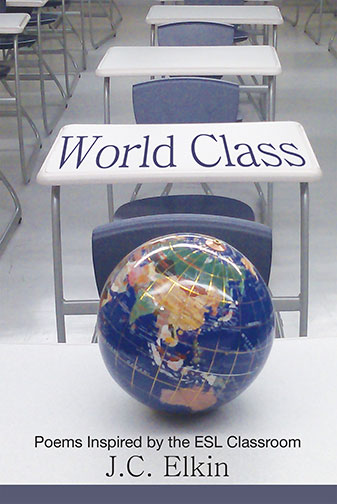


by J.C. Elkin
Apprentice House, 2014
38 pages

A Review by Juliana Woodhead
Our world is increasingly global. Daily life reminds us of this, whether directly or indirectly—encounters on the street, stories in the news. At some point we have all come across someone for whom English is a second or foreign language. As native speakers, it is difficult for us to understand their struggles. Not just linguistically, but also culturally, and often economically. In World Class, J.C. Elkin invites us to join her ESL classroom to witness these struggles.
From the outset,
the invitation is an intimate one. The dedication page bears a haiku —
In E.S.L. class
where new friends can’t converse, they
hold hands, beaming joy.
—in place of a traditional dedication. Already, we are part of this group of new friends. Present and attentive but unable to converse, we become observers sitting quietly in the back row.
The opening poems draw us slowly from the general to the specific. We begin to see the students, these “‘foreigners” blown in on “dust storms of change,” as individuals rather than nameless others. We meet characters remarkably similar to ourselves. Hala, a woman “of a certain age, married with grown kids.” With her ulcers and arthritis, she is a “mirror” of the speaker herself. Then there is Verdad, a mother, fretting about her son learning swear words at school while she attends classes to understand him. We cannot help but empathize; we know these worries.
Other times, we cannot help but laugh. The learning process is inevitably amusing, as students trip and slip over unfamiliar words and grammar. One student falls into a “bad homonym,” another has “no sense of syntax at all.” “Me restaurant eating friends,” he proclaims. Anyone who has ever made a mistake in French class or struggled to order lunch from a phrase book will smile and understand. These moments, though funny, do not make fun of their subjects. We are not laughing at them and their mistakes, we are laughing at language and its traps.
Plunging further into the collection, we find ourselves becoming ever more intimately involved. More intimate, perhaps, than anticipated. The speaker at times allows us into moments of doubt and dislike, moments that reveal her internal struggle in working with (and inevitably caring about) her students. These moments remind us that this teacher-student relationship is inextricable from the native-foreigner relationship. When Fazilah “slumps at her desk, black nylon hijab a puddle,” from fasting in the August heat, the speaker’s tolerance slips. When Françoise, who can’t be bothered to arrive on time or pay attention, stops coming, the speaker admits to not missing her. These moments make us consider ourselves. As we read the poems, we react to the poems and are then left to reflect on those reactions. If we are put off by the speaker’s anger towards certain students, does that mean we do not feel for Fazilah as she struggles through her fast? If we agree, does that mean we are bigoted? We can think it is wrong for the speaker to send Françoise away, but what would someone else do in her place? When there are so many others eagerly waiting? When “the wait-list is as long as a fence?”
As a whole, this slim volume charms. Throughout, Elkin keeps the voice conversational, allowing easy access into the poems and making the content all the more relatable. The accessibility of the language befits both the subject matter and, likely, the intended readership. This is poetry for the people. Poetry for those who live it. It is easy to imagine reading World Class in a classroom setting — ESL or otherwise — and there is a lot here for students to discuss.
The ultimate strength of World Class is the speaker’s willingness to be so revealing — both of others and of herself. It is through this exposure that the poems truly open a window into lives we so often overlook, bringing us to see our world and its inhabitants anew.
To learn more, visit: World Class
Reviewed by Juliana Woodhead
Juliana Woodhead received her Bachelors of Arts Degree in English and Physics from Sarah Lawrence College, and a Masters of Arts Degree in Creative Writing from University of East Anglia, Norwich, England. She is the poetry editor for The Writing Disorder. Juliana speaks fluent Modern Greek, having lived in Greece for four years, including a year abroad at Arcadia University in Athens, Greece.
ISSUE:
S P R I N G
2014
SUPPORT THE ARTS
DONATE TODAY
GET A FREE T-SHIRT!
ISSUE:
S P R I N G
2014
SUPPORT THE ARTS
DONATE TODAY
GET A FREE T-SHIRT!
By accessing this site, you accept these Terms and Conditions.
Copyright © 2010-2014 TheWritingDisorder.com ™ — All rights reserved